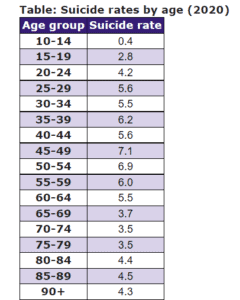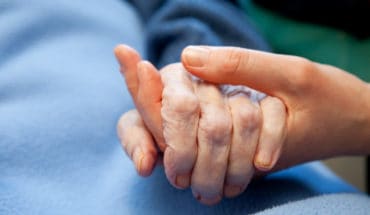Suicide rates among women aged 45 to 54 — the most common age to be experiencing menopause and perimenopause — have risen 6% in the last 20 years, defying a trend for falling rates among older women[1], reveals research by Menopause Experts Group.
Those aged 45 to 54 have the highest suicide rate among women, with 7.1 deaths per 100,000 females aged 45 to 49, and a rate of 6.9 for 50 to 54-year-olds. By comparison, the rate for 65 to 69-year-olds was only 3.7 per 100,000 in the latest figures.
Suicide rates for older women fell by 50 per cent from 1981 to 1994, and rates have continued to drop since for those aged over 55.
But the rates for women aged 45 to 54 have bucked the trend, and since the late 1990s, suicide rates for 45 to 54-year-olds have been rising.
Between 1998 and 2020, rates for over-55s fell 28%, but those for 45 to 54-year-olds rose 6%.
A ten-year moving average shows rates for 45 to 54-year-olds hit a low point of 6.5 in 1998, with the latest average equivalent 6.9% higher at 7.0. Based on an individual year, rates of 7.0 in 2020 are 14% higher than the low of 6.1 seen in 1999.

One woman told how she became seriously ill with depression at 53 and attempted suicide. Julie (not her real name) believes that going through menopause played a part in her illness.
Julie said: “Part of me wonders about the part menopause played in my ill health, and whether I should have been treated with antidepressants or with HRT.”
Many women going through menopause have their symptoms dismissed or misdiagnosed, meaning that large numbers are left to cope alone. Issues can include exhaustion, anxiety, depression and weight gain.
Women can also find themselves sandwiched between looking after both their children and aging parents, while those without an understanding partner can find themselves isolated.
Menopause Experts Group is calling on women who are struggling with stress, anxiety and depression to call a helpline like The Samaritans on 116 123 or talk to a professional as soon as possible.
If you are struggling to cope, please call Samaritans for free on 116 123 or contact other sources of support, such as those listed on the NHS’s help for suicidal thoughts webpage. Support is available round the clock, every single day of the year, providing a safe place for anyone struggling to cope, whoever they are, however they feel, whatever life has done to them.
During her 12 years as an Advanced Psychotherapist, Menopause Experts Group founder Dee Murray treated many women struggling with mental health issues during the perimenopause. Many did not realise the impact that their changing hormones had on their psychology.
Dee Murray, founder and CEO at Menopause Experts Group, said: “Menopause affects every woman differently, but for many it can bring unpleasant physical, emotional and psychological symptoms that can be challenging to deal with.
“Mental health issues like depression, anxiety and stress are hard to deal with, and many women will not know that they can commonly be caused by menopause. We cannot ignore what is happening or let these women suffer.
“Women who are not aware they are going through menopause can be caught off guard by feelings of worthlessness, confusion and a complete lack of confidence.
“As well as those in the medical profession, psychologists, psychotherapists and counsellors need to be trained in the basic knowledge of menopause so they can identify the root causes in patients they treat.
“Women going through menopause need support from friends, family and colleagues, and we would recommend that everyone takes our free training so they are ready for whatever perimenopause and menopause throw at them.
“Many women in their 60s are happier post-menopause as the body and brain adjust to new hormone levels. This clearly has an impact on their psychology and may partly explain why suicide rates drop off later in life.
“If you are struggling to cope, please call Samaritans or other sources of support, which can be found on the NHS’s help for suicidal thoughts webpage.”
Menopause Experts Group offers comprehensive, trustworthy and up-to-date information to help women understand and manage often debilitating symptoms like forgetfulness, hot flushes, anxiety, headaches, itchy skin, night sweats, brain fog and low or non-existent sex drive.
Training has been provided to organisations including the NHS, Curves Gyms, John Lewis, Metropolitan Police, MOD, Finastra, Tekmar as well as many legal, HR and employee benefits companies. The training is completely free, making vital information available to all people whatever their ability to pay.
- Gut microbiome could delay onset of type 1 diabetes - 3rd April 2025
- The da Vinci 5 Robot Is Set To Transform Bariatric Care: - 31st March 2025
- Beyond money: the hidden drivers fuelling child food insecurity - 31st March 2025






